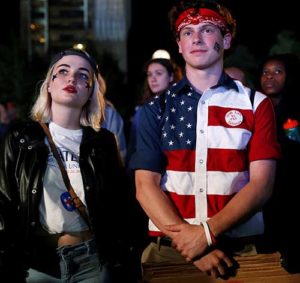 When I was contemplating the focus for this column, my look to the liturgical calendar suggested a focus on All Saints or All Souls Days. I even had thoughts about some of the annual discussions that every priest has about the pros and cons of Halloween, Haunted Houses and such. But any of those themes would be too obvious, and would ignore the proverbial 900-pound gorilla in the middle of the country – the election!
When I was contemplating the focus for this column, my look to the liturgical calendar suggested a focus on All Saints or All Souls Days. I even had thoughts about some of the annual discussions that every priest has about the pros and cons of Halloween, Haunted Houses and such. But any of those themes would be too obvious, and would ignore the proverbial 900-pound gorilla in the middle of the country – the election!

Young people watch the debate between U.S. Republican presidential nominee Donald Trump and Democratic presidential nominee Hillary Clinton outside Hofstra University, the site of the first presidential debate Sept. 27 in Hempstead, N.Y. In spite of the current, often negative discourse this election season, Herald of Hope author Fr. Paul Hartmann finds hope in democracy itself. (CNS photo/Shannon Stapleton, Reuters)
Offering reflections on the election is challenging. But, I felt I should put that challenge before myself. The election this year is certainly a historic event which cries out for us to find some hope in the midst of it all.
Feel free at this point to insert your own humorous comments asking which is a scarier subject to tackle – Halloween or the election? Please, don’t stop reading for fear of too much politics. My goal is to find the hopefulness in the election — or at least following the election — which exists apart from either candidate or political party. So here goes … where is there hope to be found?
There is hope in that the big picture of democracy continues no matter the results. Winston Churchill, in 1947 before the British House of Commons, offered the observation that “no one pretends that democracy is perfect or all-wise. Indeed, that democracy is the worst form of government except for all those other forms that have been tried.”
In America’s 230-year history, we have had 43 successful and peaceful transitions of presidential power. Contrary to the pessimistic speculations of some, rest assured that we will have 44.
There is hope in a political process and system which constantly strives to renew itself. Few people realize the party we now call Democrats traces its roots to a party once called Republicans, and present day Republicans are a relatively young political movement. Or does anyone recall that Federalists and Whigs were once considered major parties in America?
There is hope in ways that we ourselves don’t always see. When each of the last three popes has visited the United States, each has expressed admiration for the strength and endurance of the values that have marked the American experiment. When Pope Benedict XVI visited in April 2008, he encapsulated his view of our country in two observations given from the South Lawn of the White House.
First, he pointed out that “from the dawn of the Republic, America’s quest for freedom has been guided by the conviction that the principles governing political and social life are intimately linked to a moral order based on the dominion of God the Creator.” But our Holy Father immediately acknowledges that this was not a simple endeavor, either for communities or for individuals.
Pope Benedict would go on to point out that “freedom is not only a gift, but also a summons to personal responsibility…. It demands the courage to engage in civic life and to bring one’s deepest beliefs and values to reasoned public debate.”
We can draw from this that, especially in this particular election year, there is hope because of the faith-filled people involving themselves in the American political process, some for the first time. Obviously, this new or renewed populism must be properly understood and credibly lived.
Anger must be set aside; dignity and integrity in actions, in discourse, and in intentions must be lifted up once again. But, these most valued characteristics will not manifest themselves unless we affirm them, and only when we demand them. We must find a new courage to demand them, for neither the media nor the political parties will do this for us.
So there is hope in democracy itself. There is hope in the way we constantly renew ourselves as a nation. There is hope to be found in that the world generally still envies what we have in the USA. There is hope in the people of this country – our families, neighbors and friends who are the constitutive components of the lived Catholic social teachings of subsidiarity and solidarity.
And so, we are at the brink of what truly is our greatest hope. By referring to Catholic social teaching, or when Pope Benedict calls upon us to live out our deepest beliefs and values in the public square, our search for hope comes around to where it should always begin and where is must ultimately find its end – in the Christ Jesus himself.
The election will be decided Nov. 8. To read the news, it will be a day scarier than any Halloween Haunted House. But, just as will be the case after All Hallows Eve, we will have our prayers for the intercession of the saints and our recognition of the promise made to all souls. We will have Jesus Christ as our true Herald of Hope!
